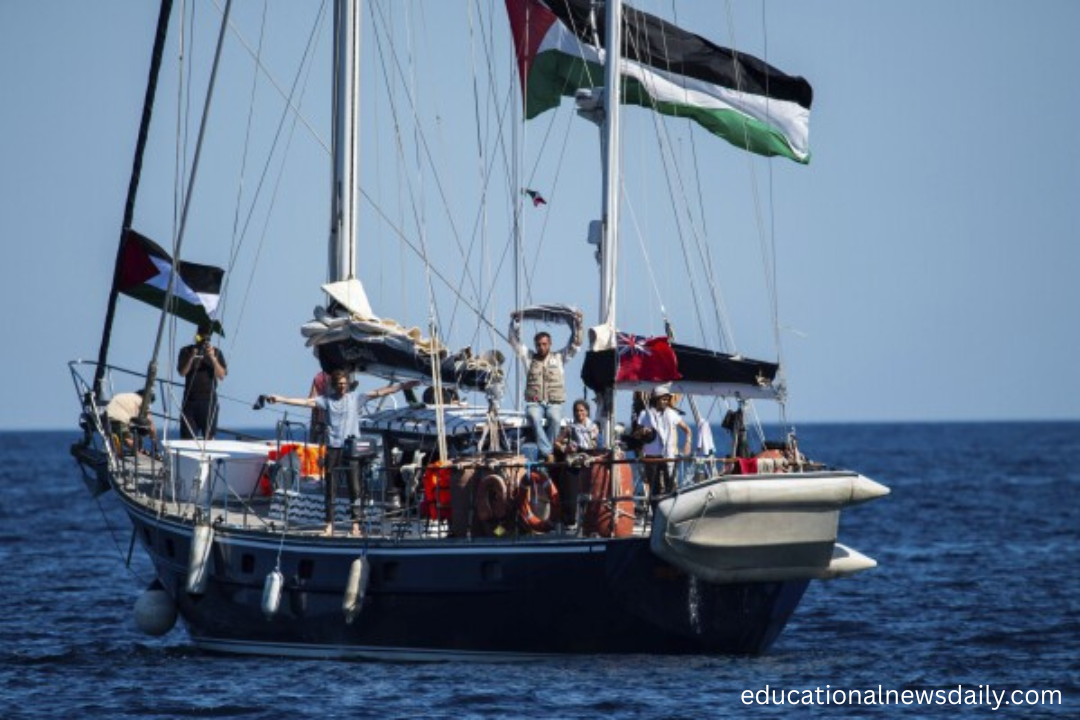Tensions continue to rise in the Middle East as Israel moves to deport activists from the recent Gaza Aid Boat mission. Among those detained is renowned climate activist Greta Thunberg, whose involvement has sparked international attention. The Gaza Aid Boat aimed to deliver humanitarian aid to the besieged Gaza Strip, defying an Israeli naval blockade. Authorities intercepted the vessel shortly after it entered restricted waters, citing security concerns.
Humanitarian Goals of the Gaza Aid Boat
Organized by a coalition of international NGOs, peace activists, and human rights advocates, the Gaza Aid Boat sought to raise awareness about the humanitarian crisis in Gaza. The mission focused on delivering food, medical supplies, and water purification equipment. Organizers emphasized that the Gaza Aid Boat was a peaceful demonstration intended to challenge the ongoing blockade that has restricted the movement of goods and people in and out of Gaza since 2007.
Greta Thunberg’s Involvement Draws Global Focus
Greta Thunberg’s participation in the Gaza Aid Boat initiative significantly increased the campaign’s visibility. Known for her outspoken climate activism, Thunberg stated that environmental justice cannot be separated from human rights. Her decision to join the Gaza Aid Boat mission was framed as an act of solidarity with Palestinians facing severe environmental and health challenges due to the blockade. Thunberg’s presence on the Gaza Aid Boat drew swift condemnation from Israeli officials but was widely praised by global activists and humanitarian organizations.
Israel’s Justification for Deportation
Israeli authorities argue that the Gaza Aid Boat violated national security laws by attempting to breach the naval blockade, which Israel insists is necessary to prevent arms smuggling into Gaza. According to an official statement, all activists aboard the Gaza Aid Boat, including Greta Thunberg, will be processed for deportation and barred from re-entering Israel for a specified period. Security experts claim that the Gaza Aid Boat presents legal and operational challenges, emphasizing that no country would tolerate unauthorized vessels entering military exclusion zones.
International Response to Gaza Aid Boat Crackdown
The detention and impending deportation of the Gaza Aid Boat activists has sparked global debate. Human rights groups, including Amnesty International and Human Rights Watch, have condemned the move as a violation of international humanitarian law. European Union officials have requested an immediate explanation from Israeli diplomats regarding the treatment of individuals aboard the Gaza Aid Boat.
Social media platforms witnessed a surge in hashtags like #GazaAidBoat and #FreeGreta, underscoring global concern over the situation. Many users called on the international community to protect the rights of peaceful demonstrators and uphold freedom of navigation in international waters.
Legal Implications of Intercepting the Gaza Aid Boat
Legal experts have raised concerns about the legality of intercepting the Gaza Aid Boat in international waters. Under the United Nations Convention on the Law of the Sea (UNCLOS), civilian ships operating peacefully may not be intercepted without clear justification. Activists argue that the Gaza Aid Boat posed no threat and that Israel’s actions constitute an unlawful act of aggression. Legal scholars continue to debate whether the interception of the Gaza Aid Boat could be challenged at the International Criminal Court (ICC), given the broader context of the Gaza blockade and humanitarian law.
Environmental Concerns in Gaza Highlighted by the Aid Boat
The Gaza Aid Boat also sought to bring attention to the environmental catastrophe unfolding in Gaza. With its water system on the verge of collapse and air pollution at hazardous levels, the strip faces significant ecological and health challenges. Thunberg and other environmentalists aboard the Gaza Aid Boat stressed that decades of blockades and military conflict have devastated Gaza’s natural resources. Clean water, sanitation infrastructure, and sustainable energy were central issues raised during the mission. The Gaza Aid Boat intended to deliver solar-powered filtration devices and eco-friendly medical supplies.
Media Coverage and the Gaza Aid Boat Narrative

Mainstream media outlets across Europe and the Americas have reported extensively on the Gaza Aid Boat incident. Coverage has focused not only on Thunberg’s high-profile involvement but also on the broader implications for regional peace efforts and human rights. Several editorials criticized Israel’s aggressive stance toward the Gaza Aid Boat, while others defended its actions as a necessary security precaution. The global narrative surrounding the Gaza Aid Boat continues to evolve, with many analysts viewing the incident as a test case for international humanitarian action.
Calls for Future Gaza Aid Boat Missions
Despite the backlash, organizers of the Gaza Aid Boat have vowed to continue their efforts. Future missions are already in the planning stages, with even broader coalitions forming to support humanitarian deliveries to Gaza. Activists argue that the world must not remain silent in the face of what they call a human rights disaster. Supporters of the Gaza Aid Boat are mobilizing diplomatic efforts and public campaigns to ensure future missions receive international protection and legal legitimacy.
Frequently Asked Questions (FAQ’s)
What is the Gaza Aid Boat?
The Gaza Aid Boat is a humanitarian mission organized by international activists and NGOs to deliver essential supplies such as food, medicine, and clean water equipment to Gaza. The mission aims to challenge the ongoing Israeli blockade and raise awareness of the humanitarian crisis in the region.
Why did Israel intercept the Gaza Aid Boat?
Israel intercepted the Gaza Aid Boat citing national security concerns. Officials claimed that the boat was attempting to breach a legally enforced naval blockade that aims to prevent weapons smuggling into Gaza. Critics argue that the interception violates international law.
Who was on board the Gaza Aid Boat?
The Gaza Aid Boat included a diverse group of activists, human rights advocates, and environmentalists from multiple countries. Among the most prominent figures was climate activist Greta Thunberg, whose presence drew widespread media attention to the mission.
Was the Gaza Aid Boat in international waters?
According to organizers, the Gaza Aid Boat was sailing in international waters when it was intercepted by Israeli naval forces. Legal experts argue that such an interception may breach maritime law unless a legitimate security threat is proven.
What were the goals of the Gaza Aid Boat mission?
The primary goal of the Gaza Aid Boat was to deliver humanitarian aid and highlight the severe living conditions in Gaza due to the blockade. Secondary objectives included promoting environmental justice and challenging the legality and morality of the siege.
What legal action can be taken over the interception?
Legal scholars suggest that the interception of the Gaza Aid Boat could potentially be challenged under international maritime and humanitarian law. Human rights organizations are reviewing the situation and may pursue legal avenues, including appeals to the International Criminal Court.
How did Greta Thunberg justify her involvement?
Greta Thunberg stated that her participation in the Gaza Aid Boat was driven by a belief that climate justice is deeply linked to human rights. She emphasized that environmental degradation in Gaza cannot be addressed without lifting the blockade and improving basic living conditions.
Will there be more Gaza Aid Boat missions?
Yes, organizers have announced plans for future Gaza Aid Boat missions. They are calling for international support and diplomatic guarantees to ensure safe passage and successful delivery of aid to Gaza in upcoming voyages.
Conclusion
The fate of the activists aboard the Gaza Aid Boat, including Greta Thunberg, remains uncertain as diplomatic negotiations unfold. Israel’s actions have ignited a broader discussion about the limits of humanitarian activism and the legal frameworks governing international waters. The Gaza Aid Boat has become a powerful symbol of resistance, environmental justice, and global solidarity with the people of Gaza. As this story continues to develop, the Gaza Aid Boat mission may very well mark a turning point in how the international community addresses humanitarian crises under blockade and occupation.

